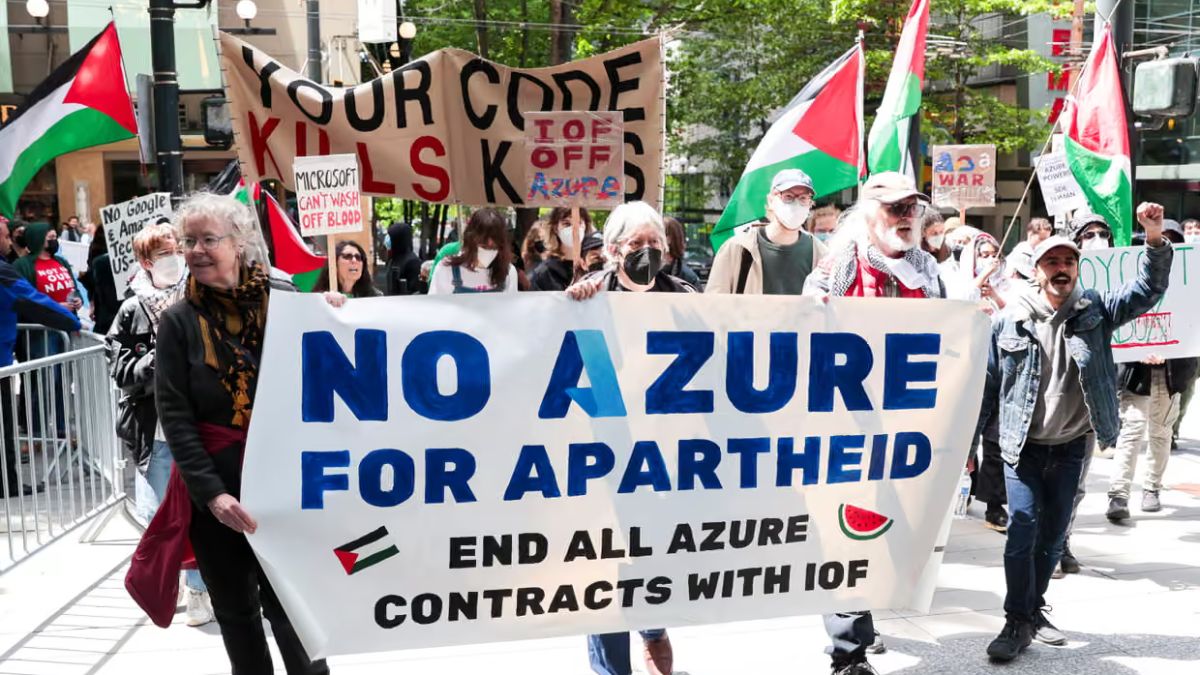Did Israel conduct mass surveillance of Palestinians using Microsoft technology? Investigation underway

Microsoft has launched a formal review into allegations that its Azure cloud services were used by Israel’s military surveillance agency, Unit 8200, to facilitate the mass surveillance of Palestinians.
Why now?
Microsoft's move follows a joint investigation by The Guardian, +972 Magazine, and Local Call, which revealed that Microsoft’s technology had been employed to store intercepted Palestinian phone calls.
ALSO READ | Will Israel's proposed West Bank settlement plan end the two-state solution?
The company said that using Azure to hold data obtained through broad or mass surveillance of civilians in Gaza and the West Bank would breach its terms of service. Microsoft has also pledged to release the findings publicly.
The review builds on an earlier internal investigation in May, when Microsoft announced that it had found “no evidence to date” of Azure being used to target or harm people in Gaza. The revelations have since prompted concern within the company’s leadership that some Israel-based staff may have withheld information during that initial review.
Executives were reportedly asked whether certain employees felt greater loyalty to their country’s military than to their employer, as a number of Microsoft staff with knowledge of Unit 8200 projects had previously served in the elite signals intelligence unit.
On Azure's alleged involvement
According to the investigation, Unit 8200 used a segregated section of Azure to store recordings of millions of daily phone calls made by Palestinians in Gaza and the West Bank. Intelligence drawn from this immense archive has reportedly been used to research and select bombing targets in Gaza.
One source described how officers would scrutinise calls made by people in the immediate vicinity when preparing strikes on individuals in crowded neighbourhoods.
The system’s use has reportedly expanded during the current Gaza campaign, which has left more than 60,000 people dead (mostly civilians). Initially, the system had been directed towards the West Bank, where information stored in Azure was allegedly used to blackmail, detain or even justify the killing of Palestinians.
The project was spearheaded by Yossi Sariel, Unit 8200’s commander between 2021 and 2024, who aimed to transform intelligence gathering through cloud technology.
Sariel sought to transfer large volumes of Unit 8200’s data, including classified material, into Microsoft’s cloud platform to enable mass surveillance.
The ambition was summed up in an internal mantra: “A million calls an hour". Leaked Microsoft documents and accounts from sources suggest the company was aware as early as late 2021 that Unit 8200 intended to shift substantial amounts of sensitive intelligence data to Azure.
Reports indicate that Microsoft’s chief executive, Satya Nadella, met Sariel in late 2021 and expressed support for the aspiration to move such material into the cloud.
Microsoft has since stated that Nadella’s presence was brief and that no discussion of content took place. The company has consistently maintained that it had no information about the specific data stored by Unit 8200, nor awareness that its services were being used for civilian surveillance. Yet, documents indicate that some Israel-based employees, including former Unit 8200 officers, likely understood the purpose of the project.
Pressure from within
The disclosures have intensified pressure on Microsoft from staff and campaigners. The worker-led group No Azure for Apartheid has staged protests against the company’s ties to the Israeli military, accusing it of complicity in genocide and apartheid.
ALSO READ | Global outrage grows after the death of Al Jazeera journalist Anas al-Sharif in an Israeli airstrike
The group has demanded that Microsoft sever all links with the Israeli army and disclose them publicly. In response to the new inquiry, it dismissed the review as “yet another tactic to delay” rather than meet those demands, insisting that selling technology to the Israeli armed forces was unethical.
The Israel Defence Forces initially claimed that Microsoft had never worked with them on data storage or processing, a statement that surprised the company’s leadership given the existence of contracts.
The military has since said its work with companies such as Microsoft is conducted through regulated and legally supervised agreements, in accordance with international law.
For Microsoft, the partnership was viewed as both a lucrative commercial venture and an opportunity to enhance Azure’s global brand, with expectations of generating hundreds of millions of dollars in revenue.
What comes next?
The formal review now underway aims to establish whether the new allegations are correct and to clarify the nature of the information stored in Microsoft’s data centres.
The investigation will also examine how any such data may have been used by the Israeli military. Microsoft has promised to make the findings public, reflecting growing scrutiny over the role of major technology companies in military operations that touch directly on human rights.
Middle East